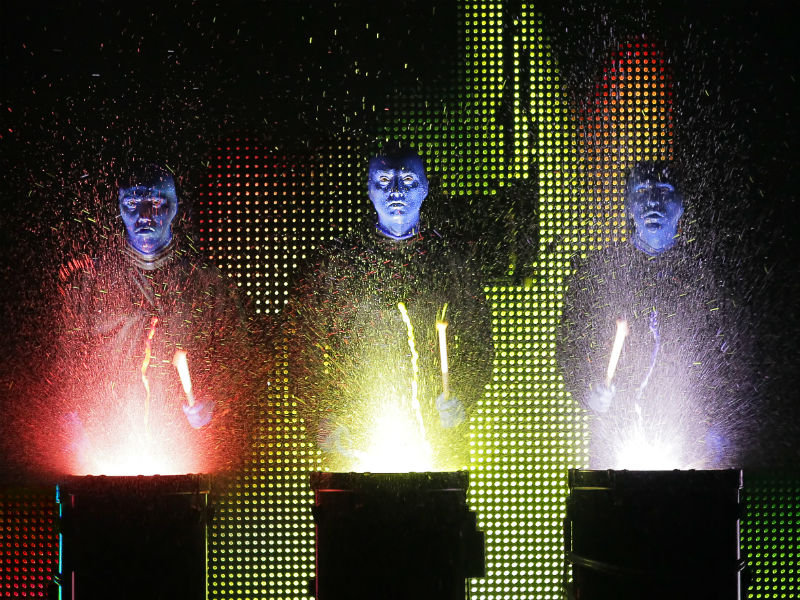The Blue Man Group is famous for several things: funky instruments, those old Intel ads, Tobias Funke proclaiming that "I blue myself!" on "Arrested Development" and, of course, the whole being covered in blue paint thing.
But one of the crucial elements of the Blue Man Group is that they don’t talk. They’re inquisitively mute. So imagine my surprise in getting to interview a Blue Man (at least the transcription would be easy) before their weekend-long stint at the Marcus Center for the Performing Arts.
Well, the real man behind a Blue Man at least: Mike Brown, who’s spent over a decade playing the mysterious blue being, who let me in on how one becomes a Blue Man, how dogs are one of his biggest influences and, of course, how long it takes to get all blued up.
OnMilwaukee.com: So how does one become a Blue Man?
Mike Brown: Well, I went to school for theater, and I was also a drummer in high school. I continued playing drums throughout college. I love acting, and I love drumming, and when I first saw the show in 1997 I believe, I thought it was the perfect combination of the two things that I loved. It became something I really wanted to strive for.
So when I moved to New York City after college, I started doing backstage crew work and ended up working for Blue Man as a crew member, running the show. After six months of that, they had an open call audition, and I thought I had the right ingredients to make it possible. So I went out for the audition, and to this day, I’m still living a dream come true.
OMC: With your behind-the-scenes work, did you pick up on stuff?
MB: Oh yeah, definitely. I would sit backstage and drum on a pad while the real Blue Men were out on the stage playing the songs. So I had a little bit of insider’s knowledge definitely when it came to the music, and I kind of knew a little bit more about the character. But the character is so mysterious, and you learn so much through the training process that I didn’t know quite exactly what it was. That’s kind of the beautiful of Blue Man Group; it can mean anything to anyone.
OMC: How do you practice the acting of playing a Blue Man, seemingly this somewhat naïve blank slate? How do you create a character out of a wordless being?
MB: Interestingly enough, my first day of training they took us to a dog park, and we watched dogs for about two hours, just the way they interact with no words and instinctually just … are. They’re right there in the moment; there’s no question as to how they’re feeling. They’re either super happy, super afraid or they’re just acting off of their natural feelings. So really, if you want to train to be a Blue Man, just sit somewhere quietly and respond to things in the moment instinctually.
However, a Blue Man isn’t really naïve. He’s actually super intelligent and doesn’t really get afraid of things. He wouldn’t run from something weird; he’d probably get closer to it to figure out what it is and how it works. He looks at the world completely differently, in terms of he’s innocent yet he is willing to go out there without fear of judgment or retribution. He’s innocent yet willing to jump off the cliff to see what happens.
OMC: Exploring without reservations.
MB: Exactly. And that’s what we hope to evoke in our audiences. We hope to fill them with this natural sense of wonder about the world and what’s around them and how we interact with one another as beings.
OMC: Obviously you play some very interesting percussion instruments. How do you train for those odd instruments and their intricacies?
MB: That just takes practice with the actual instrument, sitting down and knowing how everything works and how the notes are set up. The beautiful thing about Blue Man is that nothing is written down into musical charts for any of the music. It’s all passed down through the people who have been there before you when you get hired for training. And that actually helps build a large sense of community and a large sense of almost tribal language that we all can speak and understand. It really helps bond everybody in this awesome group.
OMC: What’s your favorite of the quirky large instruments that you get to play?
MB: I love the drumbone, which is like a trombone that, instead of blowing into it, you drum on a playing surface that allows the tone to resonate. And you actually need all three Blue Men to play the instrument, because some pieces connect and are used together – which in a weird way is a nice metaphor for the Blue Men and the audience. We all want to come together and bond to create a much larger experience and a bigger energy.
OMC: The show itself has those messages about humanity and technology – the divide it’s created as well as the connectivity. How do you personally try to convey that during the show?
MB: It’s actually funny. We have some meet-and-greets after the show, and a lot of people nowadays, during a meet-and-greet, their phone is between the Blue Man and that person. Instead, we like to look into their eyes and ask, "How do you feel? Did you enjoy the show? Did you change as a person over the course of the show?" We’re asking all those questions with our eyes, which … I know that nobody can really read somebody’s mind, so they don’t know what we’re asking them; they just think that we’re curious and different. But that transcends over a phone; that gets past that little five-inch wall of your phone and actually allows us to have an actual moment or experience.
So personally, I feel that the show actually – and the Blue Men – are successful every night in getting past that wall between people and educating the audience that phones are great, but there’s a much more beautiful and tangible experience that you could have sitting right next to you.
OMC: I have to ask: How long does it take to get all blued up before each appearance and show?
MB: The actual process of getting into costume and putting on the makeup is fairly simple. It takes maybe about 20 to 30 minutes.
But we also like to think more about the transformation process, from being Mike Brown to then becoming a Blue Man. That process is more about mentally putting yourself in a place where anything could happen and not cast judgment, just responding naturally as a child would. That process is a little harder to get into, because it’s stripping away the way our society is told to be. We should be more reserved and respectful toward people, and it’s not that the Blue Men aren’t respectful. It’s just they have a bit more innocence and are naturally going to step a little further into people’s private space or pour a bunch of paint on a work of art just to see how he can change it.
OMC: So really, it’s the mental transformation that’s more important than the one with the sticky blue paint.
MB: Absolutely. And I know that people always want to ask, but the funny thing is that there’s beauty in the simplicity in our costume, but once you’re in it and actually feeling and thinking like a Blue Man, you embody the Blue Man. You fuel it and give that makeup and costume its life and energy.
As much as it is a gigantic cliché to say that one has always had a passion for film, Matt Mueller has always had a passion for film. Whether it was bringing in the latest movie reviews for his first grade show-and-tell or writing film reviews for the St. Norbert College Times as a high school student, Matt is way too obsessed with movies for his own good.
When he's not writing about the latest blockbuster or talking much too glowingly about "Piranha 3D," Matt can probably be found watching literally any sport (minus cricket) or working at - get this - a local movie theater. Or watching a movie. Yeah, he's probably watching a movie.







